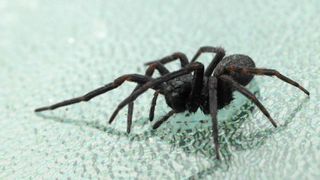
Viruses are your friend -- We're used to hearing that viruses cause deadly diseases, things like bird flu and other scary-sounding afflictions, but it turns out that not all viruses are bad. A recent study has shown that bacteriophages, viruses that infect bacteria rather than humans, actually help your body control your bacterial population. In fact, your mucus, which is known to play a crucial role in blocking out disease, attracts and locks in the phages through proteins on their surface, anchoring them to the mucal layer. This essentially creates a lethal barrier to 'unfriendly' bacteria, allowing the phages to ambush them and kill them off, protecting your cells from the nasty little bugs. [PNAS]

NASA's planet hunter taken offline by broken wheels -- When you think of satellites sitting up there in space you don't expect them to have wheels. Keplar, NASA's prolific exoplanet hunter, had four of the things, but they weren't for rolling in the conventional sense, they were used for turning. The reaction wheels, essentially massive metal gyroscopes in space, spin at between 1,000 and 4,000 RPM, and were used to manoeuvre the spacecraft in orbit. By spinning in one direction, they cause the satellite to rotate in the opposite in very precise increments, allowing scientists to target co-ordinates in deep space for study.
Unfortunately, reaction wheels have a torrid history of failure, and while Keplar can operate with only three out of the four wheels operational, now two have failed leaving NASA's eagle-eyed planet hunter paralysed. The reaction wheels could be fixed in orbit, but it's unlikely to happen, meaning Keplar's exoplanet-spotting campaign has likely been brought to an abrupt end. Efforts will continue to either try and fix the issue remotely or to crudely use the thrusters as a stand-in until Autumn, at which point scientists will give up and sadly leave Keplar dead in space. [Nature]
You're not crazy, your dog might actually be able to understand you -- Dogs can recognise the names of certain objects, that's pretty well know, but did you know that your dog might even be able to understand grammar? A recent study with a 9-year-old border collie has shown that a dog can tell the difference between "to ball take Frisbee" and "to Frisbee take ball", something that's a crucial yet highly complex part of understanding human speech. Of course, the dog had been in training for years, but it's known that other border collies learn grammatical cues from shepherds as part of their sheep herding. It's thought that with enough training, other dog breeds could replicate these kinds high-level vocal recognition. [Learning and Motivation]
![A 10 month-old Border Collie [Image credit: Starzyia from Flickr]](https://cdn.mos.cms.futurecdn.net/aecabdfe168ab1936c3e639dd46e5785-320-80.jpg)
Get daily insight, inspiration and deals in your inbox
Get the hottest deals available in your inbox plus news, reviews, opinion, analysis and more from the TechRadar team.
